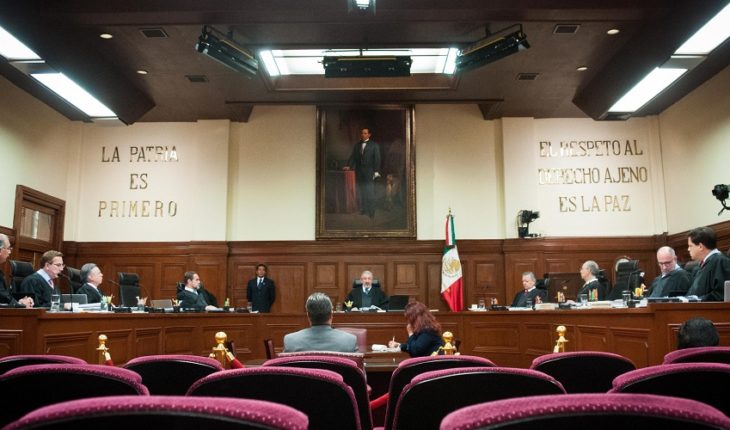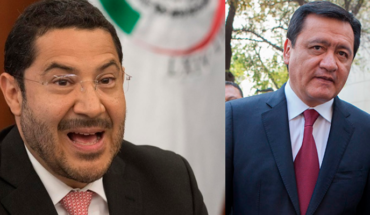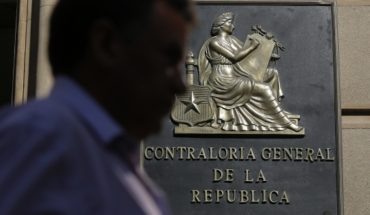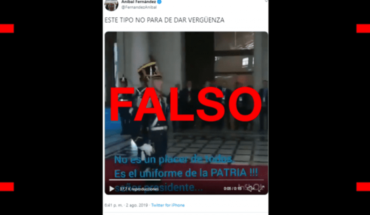the law on internal security, which is intended to legalize and regulate the intervention of the armed forces in public security tasks, is at risk. Six Ministers of the Supreme Court of Justice of the nation (SCJN) saw it yesterday unconstitutional and announced that they will vote for their complete abolition.
Contrary to what you stated the opinion of the Minister Jorge Pardo Rebolledo, who considered that the law does not violate the Constitution, Ministers who spoke yesterday detailed this standard brings vices from same approval in Congress. Even the Minister Arturo Zaldivar Lelo de Larrea called it a “fraud to the Constitution”.
What were the reasons that the Ministers of the Court considered that the internal security act violates the Constitution and should be declared null and void? Then identifies the main points that were exposed, as well as scenarios for next Thursday, which will continue with the discussion of the aforementioned law and vote for possible cancellation.
1.-the Congress did not have the competence to legislate
Eduardo Medina Mora, José Ramón Cossío and Alberto Pérez Dayan Ministers agreed that the Congress, i.e. the Chambers of Deputies and senators, lacked authority to to legislate in the field of internal security, because the legislature alone is competent to do so in national security.
Medina Mora said that the use of the military in matters of internal security is Faculty of the Executive power, by what is wrong it is intended to legislate under the argument that it is a different from the national security aspect. More even though the Constitution already States locks to limit the intervention of the armed forces in public security.
2-army intervention must be exceptional, non-permanent
this was one of the main points on which almost all the Ministers agreed. They accused that the law on internal security aims to back permanent and almost normal army intervention in matters of public safety, which should only be exceptional and at the request of States, who are responsible for the same.
The Minister Arturo Zaldívar was emphatic “this law is a fraud to the Constitution, intended to disguise as internal security is actually public safety and relates strictly to civilian authorities”.
The Ministers pointed out that there are specific and exceptional situations in which it is valid to President to give speech to the army, but insisted that this must be an extraordinary resource that must not normalize it.
“What makes the legislator with this law is to justify the provision of forces outside the assumptions that Constitution (…) It is intended to incorporate internal security to national security to regulate the military in times of peace. It is not permissible”, said Minister José Ramón Cossío.
If you really wanted to preserve the intervention of the army only as a temporary resource, added Minister Javier Laynez Potisek, in any case the internal security act must present itself as a temporary standard with expiration date, but was not the case.
The Ministers also considered that the Internal Security Act represents a “perverse incentive” for the civil authorities (State and municipal governments), which are the constitutionally required to preserve public safety, prefer delegate the task in the military instead of strengthening their police forces.
“Civilian authorities must begin to do the part that touches them so we have prepared civil forces which take charge of public safety,” said Zaldivar.
3-use of force, with risk of abuse
in his speech, the Minister Arturo Zaldívar also criticized that the Homeland Security Act refers vaguely to the theme of the legitimate use of force, which opens the door to possible abuse. This since the standard sets only in one of his articles that the Federal forces must act in accordance with its own protocols for use of force.
It should be noted that this deficiency was also detected in the project of the Minister Jorge Mario Pardo Rebolledo, and to solve it proposed that he is corrected the article by removing its current wording and changing it for a new one in accordance with the parameters of the Commission Inter-American of human rights (IACHR), to define the correct legitimate use of force.
However, the Minister Zaldívar considered that this single deficiency is sufficiently large to completely overturn a law that allows military interventions without adequate parameters of use of force.
“You have to be especially cautious with this law and the use of force. The IACHR has already manifested itself in relationship in that the use of the armed forces in security actions because the risk of human rights violations is high must be reduced to a minimum. His (military) training is not geared to protect civilians, but to defeat an enemy”.
4-the “fast-track” of the Congress
in his speech, the Minister Norma Pina Hernandez warned that the Internal Security Act has vices from the same process of approval in Congress. This hasty and hit form which was given green light without even a serious analysis.
In the first instance the Minister questioned how the House of representatives approved, by the end of 2017, an opinion just hours after it was put in the hands of lawmakers that they did not have time to analyze it. Fact that was even denounced by minority forces who asked that you suspend the vote, which did not take place.
“The opinion must have been in the hands of the legislators two weeks before a vote, not a few minutes. What quality of democracy can then have a law like this with complaints and motions that were ignored? “, said the Minister.”
Pina Hernandez also questioned the fact that in the Senate nor be allowed to carry out thorough analysis in commissions and, on the contrary, it will happen to the House again for an immediate vote, despite the objections of minority groups that were affected your right to know and study the document which was legislating.
what’s next? Conclude the debate and the vote
next Thursday at 11 in the morning session of the plenum of the Supreme Court of Justice of the nation, will resume to continue with the analysis of the resources promoted against the Internal Security Act.
To declare unconstitutional norm, as they claim instances that lodged the appeals (NHRC, INAI, and legislators), requires that 8 of the 11 Ministers of the plenary vote in favour of that option.
Yesterday the six Ministers who spoke at the meeting already outlined their vote in favour of the complete cancellation of the law. It was Eduardo Medina Mora, José Ramón Cossío Díaz, Arturo Zaldivar Lelo de Larrea, Noma Pina Hernandez, Alberto Pérez Dayan, and Javier Laynez Potisek.
Ministers missing to expose his point of view are Mario Pardo Rebolledo (who produced the opinion that declared constitutional reform), Alfredo Gutiérrez Ortiz Mena, Jose Franco González Salas, Margarita Luna Ramos and President of the Luis Maria Aguilar Morales.
The vote shall be sought at the end of the same, and if agreed the norm declared unconstitutional, it will have to be repealed. Not achieved eight votes it would have to proceed to a review article by article of the law.
translated from Spanish: 6 Ministers considered unconstitutional the law of security, why?
November 14, 2018 |





